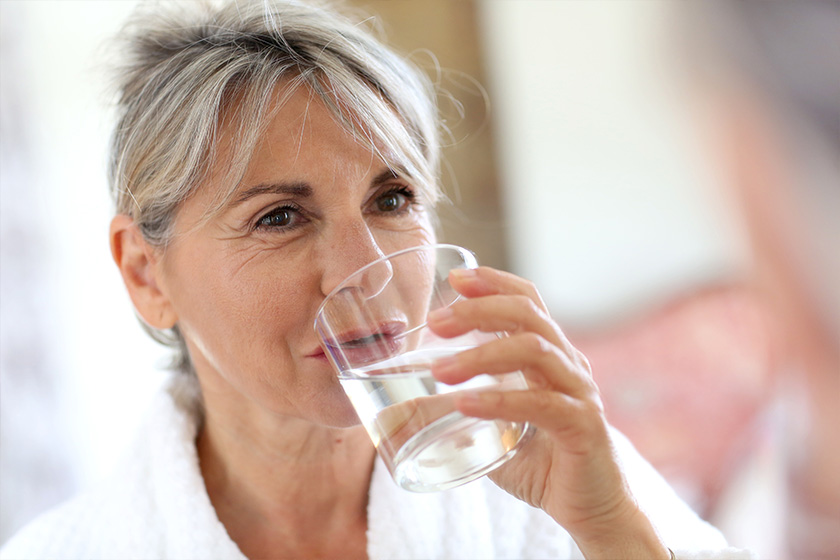It’s not uncommon for the elderly to experience dehydration, especially in hot weather or environments that don’t have great air conditioning. Dehydration can be very dangerous in older adults, and it’s important to take steps to avoid it whenever possible. We’ve compiled our top 5 ways to prevent dehydration in older adults so that you can keep safe and healthy at all times this summer.
Don’t Allow Excessive Evaporation & Elimination
When it comes to keeping hydrated, you need to think about two things: evaporation and elimination. Excessive air conditioning, especially in hot weather, can cause your body to sweat excessively. Don’t forget that increased activity levels will also increase sweat rates. When too much evaporation occurs on your skin, you become dehydrated; so when you are out of doors in hot weather or spending a lot of time indoors with powerful air conditioning units, be sure to drink plenty of water. Be aware that certain medications may interfere with normal sweating and eliminate important toxins from your body; ask your doctor if these medicines might affect you before thinking you have dehydration issues.
Always Have Water Close By
Elderly people need to drink plenty of water daily. Water helps remove waste from their bodies and keeps them looking healthy. However, to make sure that you are drinking enough, you need to have a bottle of water close by at all times so that you can take sips whenever necessary. Having water available is one of the best ways to avoid dehydration.
Use A Moisturizer
One of the best ways to avoid dehydration is to use a moisturizer. Moisturizers can help reduce and repair damaged skin, keeping it hydrated and healthy. A good moisturizer should be hydrating enough to penetrate deeply into your skin but still light enough that it doesn’t leave behind a greasy residue. The best way to choose a moisturizer for older adults is by looking at their specific skincare needs; you may need something designed with extra emollients if they have eczema or psoriasis.
Watch What You Eat
Eating well is essential for staying hydrated, but not all foods are equal. Foods that have a high-water content—like fresh fruits and vegetables—can help you stay hydrated without eating many excess calories. Plus, they’re loaded with vitamins and nutrients your body needs to stay healthy. Most food labels show how many servings are in a package; when shopping, try to find single-serving packages (i.e., 2 bananas instead of 2 bags of bananas) or pick produce that comes in individually wrapped portions (i.e., strawberries instead of an apple).
Know What Medications You Take
You should talk to your doctor about any medications you take, including over-the-counter drugs and herbal supplements. Be sure to know what those medications are so that you can prevent dehydration by knowing if they affect how much water or other fluids you need. It’s also important to be aware of side effects. Some common medications can cause confusion or disorientation in older adults and may lead to misdiagnosis of dehydration in elderly people as simply age-related changes.
Drink More If You Exercise Outside
On a hot summer day, you might think twice about going for a long bike ride or running because of the risk of dehydration. Well, as it turns out, you should also pay attention to hydration if you plan on working in your garden—or playing 18 holes of golf. According to experts, a surprising number of adults over age 65 do not drink enough fluids throughout the day. Experts say that those who exercise regularly—or do any physical activity outside—should consume 1 milliliter (about 0.04 fluid ounces) for every 2 pounds (1 kilogram) body weight loss due to sweating during exercise.







